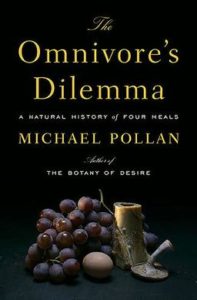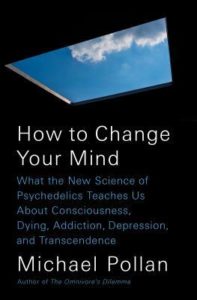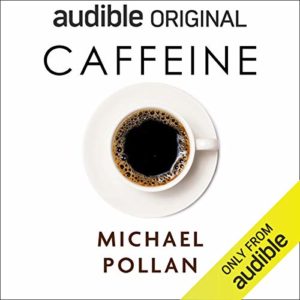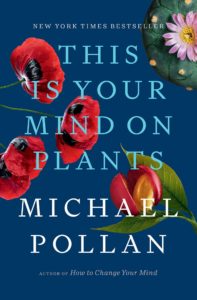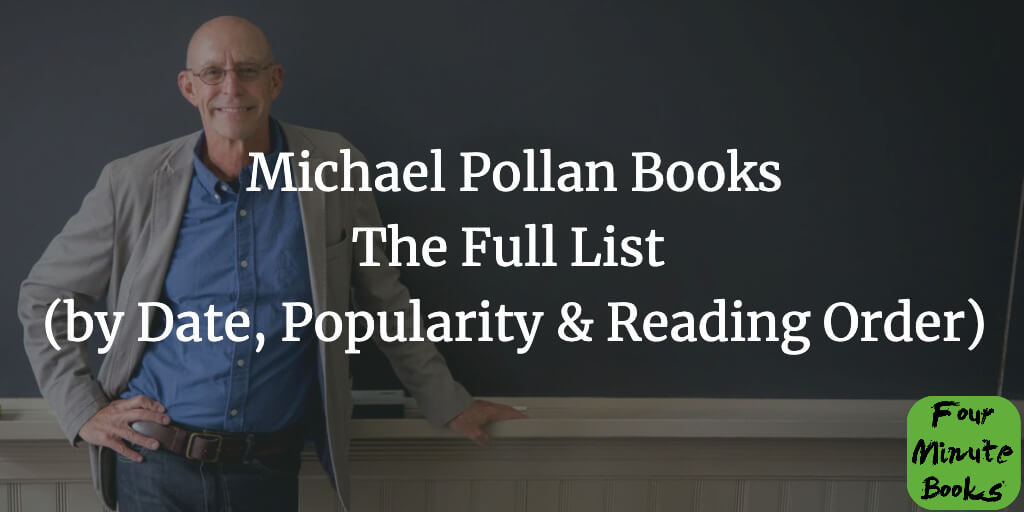
Michael Pollan is one of the world’s premier researchers on food and its socio-cultural impacts alive today. Born in 1955, Pollan has been writing books about food for over 30 years. He’s been a regular contributor to the New York Times since 1987, and more than half of his ten books have made the paper’s bestseller list. If you’re looking for the full list of Michael Pollan books, you’ve come to the right place!
Pollans research covers why we eat, how we eat, how we grow and breed what we eat, as well as why we might ingest certain substances, like alcohol, caffeine, or drugs. Next to his books, Pollan is often featured in documentaries, such as Food, Inc., which examines the damage done by corporate farming, or How to Change Your Mind, a Netflix series about the impacts and lessons we can learn from psychedelics. He also teaches a Masterclass about intentional eating.
We’ve already summarized several of Pollan’s books as part of our 1,000+ summary catalog here on Four Minute Books, and today, we’ll compile all Michael Pollan books in order of both publication and popularity for you. We’ll even included a section recommending which one you should read first.
You can easily navigate this list by clicking on whichever section interests you the most in the below table of contents. In addition, we’ve included an image of the cover of each book, a 1-sentence-summary, and our favorite quote. We’ll also share our most important takeaways and why you might want to read the book yourself.
If you want to dive deeper into any book, click the “Read on Four Minute Books” button or use one of our Amazon affiliate links to buy a copy. So, without further ado, here’s the complete list of Michael Pollan books!
Table of Contents
- All Michael Pollan Books (in Chronological Order)
- 1. Second Nature (1991)
- 2. A Place of My Own (1997)
- 3. The Botany of Desire (2001)
- 4. The Omnivore’s Dilemma (2006)
- 5. In Defense of Food (2008)
- 6. Food Rules (2009)
- 7. Cooked (2013)
- 8. How to Change Your Mind (2018)
- 9. Caffeine (2020)
- 10. This Is Your Mind on Plants (2021)
- Michael Pollan Books by Popularity
- In What Order Should You Read Michael Pollan’s Books?
- Conclusion
- Other Book Lists by Author
- Other Book Lists by Topic
All Michael Pollan Books (in Chronological Order)
1. Second Nature (1991)
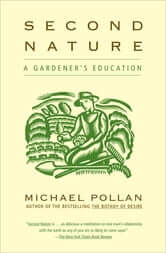
Favorite Quote
“Tree planting is always a utopian enterprise, a wager on a future the planter doesn’t necessarily expect to witness.” — Michael Pollan
The Book in One Sentence
Second Nature is a collection of essays arranged in the order of the four seasons, revealing the lessons Michael Pollan learned while trying to cultivate and master the garden of his old dairy farm in Connecticut, providing new insight on our relationships with Earth, nature, and its many inhabitants.
Why should you read it?
If you have a garden, want one, or simply feel bad for knowing so little about plants, nature, and our roots in the wilderness (pun intended), this book is perfect for you. Through Pollan’s explorations and research, you’ll deepen and reassess your relationship with nature and gain a better understanding of where plant domestication ends and the planet takes over.
Key Takeaways
- While both gardening and time in nature play a significant role in our lives, the borders between the two are blurring.
- Some plant species, like roses, have become so attuned to our care that they can no longer survive in the wild.
- Planting a tree is an act of defiance, hope, and optimism, as you likely won’t be around to see it “grow up.”
If you want to learn more, you can click below or get a copy for yourself.
_____
2. A Place of My Own (1997)
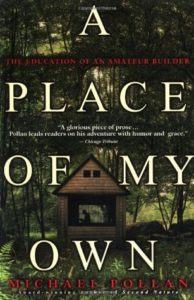
Favorite Quote
“Unlike any other form of thought, daydreaming is its own reward.” — Michael Pollan
The Book in One Sentence
A Place of My Own documents the story of Michael Pollan’s two-and-a-half-year journey to build a small hut on his property by himself, interweaving his trials and triumphs with lessons from history’s greatest builders, thus showing us the connection between the world of the material and the creative human spirit.
Why should you read it?
While it’s not exactly an IKEA instruction manual, this book will help you with any construction or even creative project you’re currently pursuing — if only by encouraging you to not give up. That said, if you’re an architect or enjoy buildings and their design, you’ll also gain a lot from Pollan’s visits to the past’s great builders. As the book’s Amazon description so perfectly puts it, “A Place of My Own is for anyone who has ever wondered how the walls around us take shape—and how we might shape them ourselves.”
Key Takeaways
- We should value daydreaming more and engage in it as a standalone activity, for it activates our creativity and brings us joy.
- A place of your own, especially one you’ve built yourself, can be a great refuge from the loud modern world.
- Building things will sharpen your senses, which will pay off countless times over the course of your life.
If you want to learn more, you can click below or get a copy for yourself.
_____
3. The Botany of Desire (2001)
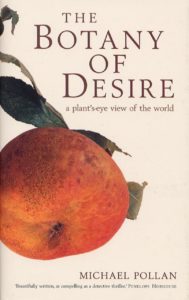
Favorite Quote
“Plants are nature’s alchemists, expert at transforming water, soil and sunlight into an array of precious substances, many of them beyond the ability of human beings to conceive, much less manufacture.” — Michael Pollan
The Book in One Sentence
The Botany of Desire describes how, contrary to popular belief, we might not be using plants as much as plants use us, getting humans to ensure their survival, thanks to appealing to our desires for beauty, sweetness, intoxication, and control.
Why should you read it?
Since the book maps four distinct plants to four distinct human desires — the apple for sweetness, the tulip for beauty, cannabis for intoxication, and the potato for control — if you have an interest in either plant or human phenomenon, you’ll likely enjoy this read. Interspersed with a mix of science and history, you’ll learn more about how our brains react to certain plants, as well as why they’ve become such popular staples in our consumption. A fascinating read from the view of plants!
Key Takeaways
- Plants use humans and animals to reproduce and spread across the world because they can’t move.
- Our brain contains a place that’s specifically designed to respond to cannabis.
- Monoculture farming makes whatever plant you’re growing extremely vulnerable, so instead of more, you might end up with less!
If you want to learn more, you can read our free four-minute summary or get a copy for yourself.
_____
4. The Omnivore’s Dilemma (2006)
Favorite Quote
“Eating’s not a bad way to get to know a place.” — Michael Pollan
The Book in One Sentence
The Omnivore’s Dilemma explains the range of food choices we face today using four meals on a spectrum from highly processed to entirely self-gathered, thus teaching us how the industrial revolution changed the way we eat, why organic food isn’t necessarily better, what truly natural food looks like, and which options we have in making the tradeoff between fast, delicious, cheap, ethical, sustainable, and environmentally friendly meals.
Why should you read it?
This is Pollan’s seminal work and probably most popular book. If you’re wondering what it looks like behind the scenes of fast food, what the hype about “organic” is all about, where you can really get “green” food, and which parts of our food experience we should always control ourselves, this one’s for you. You’ll learn to be more mindful of what you eat and why, and you’ll learn to better navigate the paradoxical choices we’re forced to make each day as we decide what to eat.
Key Takeaways
- Corn is the root of the problem.
- Organic often doesn’t mean what you think it does.
- Buy local to win on every level.
If you want to learn more, you can read our free four-minute summary or get a copy for yourself.
_____
5. In Defense of Food (2008)
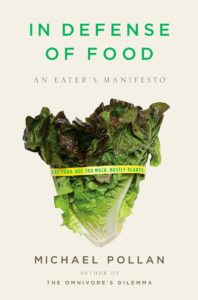
Favorite Quote
“Don’t eat anything your great-grandmother wouldn’t recognize as food.” — Michael Pollan
The Book in One Sentence
In Defense of Food describes the decline of natural eating in exchange for diets driven by science and nutritional data, how this decline has ruined our health, and what we can do to return to food as a simple, cultural, natural aspect of life.
Why should you read it?
Do you feel lost at all the calorie, ingredient, and myriad other labels stuck on food nowadays? The In Defense of Food is for you. In the book, Pollan argues that we have “over-scienced” food and that the more we focus on nutrients, supplements, and daily intake values, the worse our food choices seem to get. If you want a simpler diet, this book is for you.
Key Takeaways
- Thanks to one greedy senator you now talk about nutrients instead of foods.
- Instead of making us healthier, our obsessive focus on nutrients has made us sick.
- Choose foods that are simple, natural, and don’t make bold claims.
If you want to learn more, you can read our free four-minute summary or get a copy for yourself.
_____
6. Food Rules (2009)
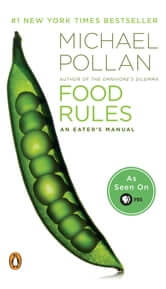
Favorite Quote
“Use the apple test: If you’re not hungry enough to eat an apple, you’re not hungry.” — Michael Pollan
The Book in One Sentence
Food Rules is an eater’s handbook outlining a complete food regimen in just three simple rules: eat natural, non-processed foods, mostly plants, and not too much of any of it.
Why should you read it?
For an easy entry into Pollan’s world, this 64-rule book condensing his previous work is perfect. In three parts, it breaks down his mantra from In Defense of Food, “Eat food. Not too much. Mostly plants,” into actionable everyday tips. If you struggle with deciding what you eat, this is a great place to start.
Key Takeaways
- Don’t make meat your main course for most meals.
- Natural foods almost always beat processed ones.
- Never eat until you’re bursting at the seams — moderation is key.
If you want to learn more, you can click below or get a copy for yourself.
_____
7. Cooked (2013)
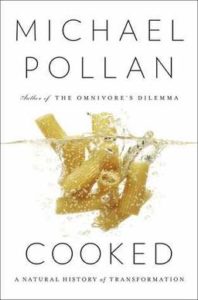
Favorite Quote
“For is there any practice less selfish, any labor less alienated, any time less wasted, than preparing something delicious and nourishing for people you love?” — Michael Pollan
The Book in One Sentence
Cooked is a historical exploration of the four primary elements we use to transform our food, from fire to water, air, and earth, celebrating traditional cooking methods while showing you practical ways to improve your eating habits and prepare more of your own food.
Why should you read it?
For anyone looking to get back into cooking after a dry spell of too much take-out and delivery, this is a great read. It doesn’t just include recipes and cooking tips but also reveals some ancient yet efficient and delicious ways of preparing food that you’ve never heard of before.
Key Takeaways
- Statistically speaking, the less you cook, the more unhealthy your diet is.
- Bread is more nutritious than the sum of its parts.
- Alcohol is enjoyed by many in the animal kingdom, not just humans.
If you want to learn more, you can read our free four-minute summary or get a copy for yourself.
_____
8. How to Change Your Mind (2018)
Favorite Quote
“Normal waking consciousness feels perfectly transparent, and yet it is less a window on reality than the product of our imaginations — a kind of controlled hallucination.” — Michael Pollan
The Book in One Sentence
How to Change Your Mind reveals new evidence on psychedelics, confirming their power to cure mental illness, ease depression and addiction, and help people die more peacefully.
Why should you read it?
Are you curious about psychedelics? Have you perhaps even experimented with them? Then this is the book for you. It’s all about conscious-altering substances and how we can use them for good rather than just crying, “This should be illegal!” Also an interesting read for anyone who’s into alternative medicine or plainly loves their cup of coffee in the morning.
Key Takeaways
- Mexican Indian tribes have been using mushrooms containing psilocybin as a healing agent for centuries.
- During a hallucinatory experience, the brain is more interconnected so that memory, emotion, and visual information all interact.
- Early tests suggest that psychedelics could be more effective than pharmaceuticals in treating depression.
If you want to learn more, you can read our free four-minute summary or get a copy for yourself.
_____
9. Caffeine (2020)
Favorite Quote
“We tend to moralize addiction, but is it really a bad thing to be dependent on a plant that you have easy access to, can afford, that isn’t ruining your life, and is giving you some benefit?” — Michael Pollan
The Book in One Sentence
Caffeine is a two-hour audiobook tackling the history of the most commonly used drug in the world, tracing it from its origins to its global availability and daily use by billions of people today, all while asking important questions about our addiction to this substance, and whether it might actually be productive.
Why should you read it?
If you drink coffee every day or even just a few times a week, you should listen to this Audible exclusive. It’s a 2-hour listen about the history of everyone’s favorite beverage. You’ll learn how caffeine became not just our default addiction but also why we’re all accepting and condoning it. If you’re curious about the results of a three-month no-caffeine experiment, you’ll also want to hear Pollan’s results after doing just that.
Key Takeaways
- Set a limit for your daily caffeine intake.
- Many people are almost always caffeinated to some degree, and though we consider this normal, it’s actually an altered state of consciousness.
- Besides its potentially negative effect on your sleep, coffee has few downsides but many benefits.
If you want to learn more, you can click below or get a copy for yourself.
_____
10. This Is Your Mind on Plants (2021)
Favorite Quote
“Sometimes the best way to show your respect for something is to just leave it alone.” — Michael Pollan
The Book in One Sentence
This Is Your Mind on Plants is an analysis of three conscious-altering substances — opium, caffeine and mescaline — which humans have been using for thousands of years, as well as how their effects have shaped our bodies, culture, and history, showing that, beyond arguing about their legalities, we must understand their potential to help us connect with both nature and ourselves in new ways.
Why should you read it?
If psychoactive plants seem mysteriously attractive to you, you should check out this book. Pollan wants to continue the conversation started in How to Change Your Mind, arguing for safe and productive use of psycho-effective plants. Whether you’re already sold on them or just curious about why they’re so taboo, this book will teach you a thing or two.
Key Takeaways
- Coffee is a powerful substance that has the potential to be both good and bad for you.
- You can brew your own opium tea in your house, but it’s not as strong, nor advisable to do so.
- Mescaline can seriously impact the way you view life and your surroundings.
If you want to learn more, you can read our free four-minute summary or get a copy for yourself.
_____
Michael Pollan Books by Popularity
Want to know which Michael Pollan books are the most popular? Here’s a short reorder of the list based on the total number of Amazon ratings, ranked from most to least.
- How to Change Your Mind: What the New Science of Psychedelics Teaches Us About Consciousness, Dying, Addiction, Depression, and Transcendence (⭐️ 6,800+ Ratings ⭐️)
- The Omnivore’s Dilemma: A Natural History of Four Meals (⭐️ 3,700+ Ratings ⭐️)
- This Is Your Mind on Plants (⭐️ 2,800+ Ratings ⭐️)
- In Defense of Food: An Eater’s Manifesto (⭐️ 2,700+ Ratings ⭐️)
- Food Rules: An Eater’s Manual (⭐️ 2,500+ Ratings ⭐️)
- The Botany of Desire: A Plant’s-Eye View of the World (⭐️ 1,400+ Ratings ⭐️)
- Cooked: A Natural History of Transformation (⭐️ 1,300+ Ratings ⭐️)
- Second Nature: A Gardener’s Education (⭐️ 500+ Ratings ⭐️)
- A Place of My Own: The Architecture of Daydreams (⭐️ 300+ Ratings ⭐️)
- Caffeine: How Caffeine Created the Modern World (⭐️ 90+ Ratings ⭐️)
Given these thousands of ratings plus hundreds of thousands more on Goodreads, we can safely assume that Michael Pollan has sold at least a million of his books, probably several. No matter which one you’ll pick, you’re guaranteed to learn something new about food!
In What Order Should You Read Michael Pollan’s Books?
Which of Michael Pollan’s books should you read first? If you ask us, here’s the order in which reading his books makes the most logical sense based on their topics:
- The Omnivore’s Dilemma: This is Pollan’s most popular and perhaps impactful book, so if you end up reading only one, make it this one. It’ll also walk you through the history of where our food has been and is coming from, setting you up well for developing a deeper understanding of food going forward.
- In Defense of Food: After getting a grasp on food history and the broad categories of suppliers, it makes sense to look around and ask: Where are we now? And where we are is in a situation where we “over-science” food. This book will show you the current problem with how we look at food right now and suggest simpler ways going forward.
- Cooked: Next, on top of the simple, “Eat food. Not too much. Mostly plants,” diet Pollan suggests in In Defense of Food, you’ll need to learn how to transform those simple foods with heat, air, earth, and water, for a bit more variety in your diet.
- Food Rules: This book will be a great summary of the above, condensing everything you’ve learned so far into 64 simple rules for intentional, healthy, and fun eating. If you stop here, you’ll still have gotten a lot out of Pollan’s work.
- The Botany of Desire: Now, if you still want more from here, you can dive deeper into the intricacies of why we are attracted to certain foods more so than others. This book will explain our desires for sweetness, beauty, intoxication, and control, and show you how we try to satisfy them through various foods.
- This Is Your Mind on Plants: Some of the most fascinating foods are conscious-altering substances. Now we’re going beyond food as a means to fill our bellies and into food as performance- or life-experience-enhancers. This book will provide an overview of opium, caffeine and mescaline specifically and is a great setup for what’s next.
- Caffeine: I’m not sure how much overlap this audio-only title has with the caffeine sections in This Is Your Mind on Plants, but at two hours, it’s a rather short listen compared to a whole book. Since this is most likely the conscious-altering substance you’re most familiar with, it might be worth listening to this as an add-on or potentially even before This Is Your Mind on Plants in case you’re hesitant to dive deeper into the drug subject at first.
- How to Change Your Mind: Now that you’re familiar with the basics of psychoactive substances, perhaps this broader look at how they can help us positively transform our lives will fall on more receptive ears — or eyes, in this case 🙂
- Second Nature: Where Pollan’s journey started is where yours should end. His first book was about gardening but also the garden as a concept, an extension, containment, and often replacement for nature. It’s the kind of thing we might look at differently while using conscious-altering substances, but the book is also an open, expansive look at life in general, which makes it a good place to start winding down your journey through Michael Pollan’s bookshelf.
- A Place of My Own: Finally, after roaming through the world of food and plants, it’s time to come home. To return to yourself. To quiet. To a shed in your garden, perhaps — and that’s exactly what Pollan is building and musing about in this book. It’ll make you feel calm and inspired, and it’ll be a great note to end on yet keep reflecting on everything you’ve learned from Michael Pollan’s books!
Alright, that’s the best order to read all Michael Pollan books in — if you ask us, anyway! Of course, if you’re only interested in a specific topic, you can start wherever you want.
Conclusion
Michael Pollan’s writing is both positive and realistic. He encourages us to stay curious about food and keep trying new things but also to remember our roots and honor nature’s intentions. His books are enlightening yet sometimes shocking, and they force us to ask ourselves some tough questions around why and what we eat. We hope this list will help you pick a vegetable, plant, or meal to learn more about, and then dive into the according Michael Pollan book!
Other Book Lists by Author
Looking for more books by the world’s most celebrated authors? Here are all of the book lists by author we’ve curated for you:
- All Brené Brown Books, Sorted Chronologically (and by Popularity)
- Jordan Peterson Books: All Titles in Order of Publication + The 5 Top Books He Recommends
- All Malcolm Gladwell Books, Sorted Chronologically (and by Popularity)
- All Michael Pollan Books, Sorted Chronologically (and by Popularity)
- Peter Thiel Books: A Comprehensive List of Books By, About & Recommended by Peter Thiel
- All Rachel Hollis Books: The Full List of Non-Fiction, Fiction & Cookbooks, Sorted by Popularity & the Best Reading Order
- All Ray Dalio Books, Sorted Chronologically (and by Popularity)
- All Robert Greene Books, Sorted Chronologically (and by Popularity)
- All Ryan Holiday Books, Sorted Chronologically (and by Popularity)
- All Simon Sinek Books, Sorted Chronologically (and by Popularity)
- All Tim Ferriss Books, Sorted Chronologically (and by Popularity)
- All Walter Isaacson Books, Sorted Chronologically (and by Popularity)
Other Book Lists by Topic
Looking for more of the best books on various topics? Here are all the book lists by topic we’ve made for you so far:
- The 60 Best Business Books of All Time (Will Forever Change How You Think About Organizations)
- The 20 Best Entrepreneurship Books to Start, Grow & Run a Successful Business
- The 14 Best Finance Books of All Time
- The 21 Best Habit Books of All Time to Change Any Behavior
- The 33 Best Happiness Books of All Time That Everyone Should Read
- The 60 Best History Books of All Time (to Read at Any Age)
- The 7 Best Inspirational Books That Will Light Your Inner Fire
- The 40 Best Leadership Books of All Time to Help You Become a Truly Inspiring Person
- The 31 Best Motivational Books Ever Written
- The 12 Best Nonfiction Books Most People Have Never Heard Of
- The 35 Best Philosophy Books to Live Better and Become a Great Thinker
- The 34 Best Psychology Books That Will Make You Smarter and Happier
- The 25 Best Sales Books of All Time to Help You Close Any Deal
- The 33 Best Self-Help Books of All Time to Read at Any Age
- The 22 Best Books About Sex & Sexuality to Improve Your Love Life & Relationships
- The 30 Most Life-Changing Books That Will Shift Your Perspective & Stay With You Forever
Last Updated on December 14, 2022
